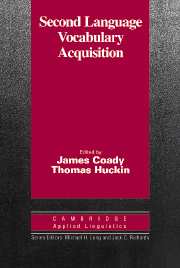Book contents
- Frontmatter
- Contents
- List of contributors
- Series editors' preface
- Acknowledgments
- I SETTING THE STAGE
- Chapter 1 Historical trends in second language vocabulary instruction
- Chapter 2 The lexical plight in second language reading: Words you don't know, words you think you know, and words you can't guess
- Chapter 3 Orthographic knowledge in L2 lexical processing: A cross-linguistic perspective
- II CASE STUDIES
- III EMPIRICAL RESEARCH
- IV PEDAGOGY
- V SUMMING UP
- Author index
- Subject index
Chapter 2 - The lexical plight in second language reading: Words you don't know, words you think you know, and words you can't guess
Published online by Cambridge University Press: 05 October 2012
- Frontmatter
- Contents
- List of contributors
- Series editors' preface
- Acknowledgments
- I SETTING THE STAGE
- Chapter 1 Historical trends in second language vocabulary instruction
- Chapter 2 The lexical plight in second language reading: Words you don't know, words you think you know, and words you can't guess
- Chapter 3 Orthographic knowledge in L2 lexical processing: A cross-linguistic perspective
- II CASE STUDIES
- III EMPIRICAL RESEARCH
- IV PEDAGOGY
- V SUMMING UP
- Author index
- Subject index
Summary
Introduction
No text comprehension is possible, either in one's native language or in a foreign language, without understanding the text's vocabulary. This is not to say that reading comprehension and vocabulary comprehension are the same, or that reading quality is determined by vocabulary alone. Reading comprehension (both in LI and in L2) is also affected by textually relevant background knowledge and the application of general reading strategies, such as predicting the content of the text, guessing unknown words in context, making inferences, recognizing the type of text and text structure, and grasping the main idea of the paragraph. And yet, it has been consistently demonstrated that reading comprehension is strongly related to vocabulary knowledge, more strongly than to the other components of reading. Anderson and Freebody (1981) survey various studies (correlational, factor analyses, readability analyses) that show that the word variable is more highly predictive of comprehension than the sentence variable, the inferencing ability, and the ability to grasp main ideas. Beck, Perfetti, and McKeown (1982), Kameenui, Carnine, and Freschi (1982), and Stahl (1983) have demonstrated that an improvement in reading comprehension can be attributed to an increase in vocabulary knowledge.
A similar picture of vocabulary as a good predictor of reading success emerges from second language studies. Laufer (1991a) found good and significant correlations between two different vocabulary tests (the Vocabulary Levels Test by Nation [1983a] and the Eurocentres Vocabulary Test by Meara and Jones [1989]) and reading scores of L2 learners.
- Type
- Chapter
- Information
- Second Language Vocabulary AcquisitionA Rationale for Pedagogy, pp. 20 - 34Publisher: Cambridge University PressPrint publication year: 1996
- 43
- Cited by

